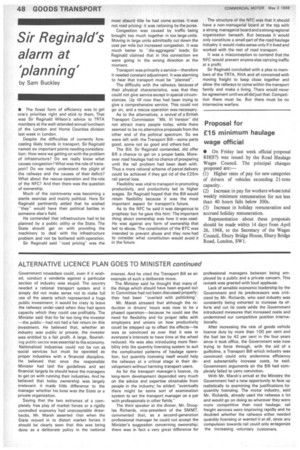Sir Reginald's alarm at 'planning'
Page 50

If you've noticed an error in this article please click here to report it so we can fix it.
by Sam Buckley
• The finest form of efficiency was to get one's priorities right and stick to them. That was Sir Reginald Wilson's advice to TATA members at the well-attended annual luncheon of the London and Home Counties division last week in London.
Despite the difficulties of currently forecasting likely trends in transport, Sir Reginald named six important points needing consideration: How were we getting on with the problem of infrastructure? Do we really know what causes congestion? What was the role of transport? Do we really understand the plight of the railways and the causes of their deficit? What about the rescue operation and the role of the NFC? And then there was the question of ownership.
Much of the controversy was becoming a sterile exercise and mainly political. Here Sir Reginald pertinently added that he wished "they" would have their political battles in someone else's field.
He contended that infrastructure had to be planned by a public utility or the State. The State should get on with providing the machinery to deal with the infrastructure problem and not be bothered with operation.
Sir Reginald said "road pricing" was the most absurd title he had come across. It was not road pricing: it was rationing by the purse.
Congestion was caused by traffic being brought too much together in too large units. Moving in large units admittedly cut down the cost per mile but increased congestion. It was much better to "dis-aggregate" loads: Sir Reginald claimed that in this connection we were going in the wrong direction at the moment.
Transport was primarily a service—therefore it needed constant adjustment. It was alarming to hear that transport must be "planned".
The difficulty with the railways, because of their physical characteristics, was that they could not give service except in special circumstances. Up till now they had been trying to give a comprehensive service. This could not go on, and a rescue operation was necessary As to the alternatives, a revival of a British Transport Commission "Mk. III Version" did not attract many people today, while there seemed to be no alternative proposals from the other end of the political spectrum. So we were left with the Transport Bill—some parts good, some not so good and others bad.
The Bill, Sir Reginald contended, did offer BR a chance to get on a proper basis. Moreover road haulage had no chance of prospering until the rail problem had been dealt with. Thus a more rational scheme of parcel delivery could be achieved if they got rid of the £25m rail parcel loss.
Flexibility was vital to transport in promoting productivity, and productivity led to higher wages. Sir Reginald hoped that the Bill would retain flexibility because it was the most important aspect for transport's future_ As to the NFC he said it was dangerous to prophesy but he gave this hint: The important thing about ownership was how it was used. He was against any form of ownership that led to abuse. The constitution of the BTC was intended to prevent abuse and they now had to consider what constitution would avoid it in the future. The structure of the NFC was that it should have a non-managerial board at the top with a strong managerial board and a strong regional organization beneath. But because it would only constitute a small part of the road haulage industry it would make sense only if it lived and worked with the rest of road transport.
It was a misconception to contend that the NFC would prevent anyone else carrying traffic at a profit.
Sir Reginald conclUded with a plea to members of the TRTA, R HA and all concerned with moving freight to keep close together and allow the railways to come within the transport family and make a living. There would never be agreement until we all did just that. Competition there must be. But there must be no internecine warfare.




































































































































































































































